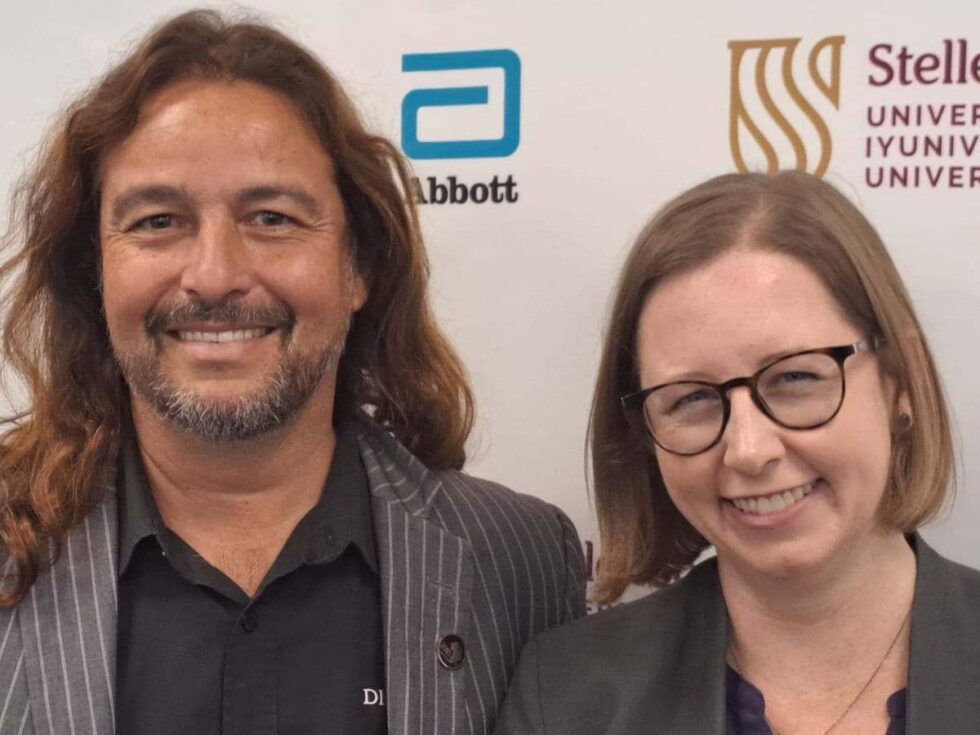
PHOTO: Prof Tulio de Oliveira, Director of CERI and Dr Mary Rodgers, Principal Scientist at Abbott
That’s according to Professor Tulio de Oliveira, Director of the Centre for Epidemic Response and Innovation (CERI) – responsible for globally-innovative breakthroughs in detection and responses to HIV and TB – upon which South Africa’s Covid genomic response is built.
He was speaking at the launch of the Abbott Pandemic Defense Coalition and state of the art genomics facility launch at the Biomedical Research Institute of Stellenbosch University on the Tygerberg Hospital campus on Thursday 20th April.
Dr Mary Rodgers, Principal Scientist at Abbott, said the ‘defense coalition’ was a global monitoring and detection initiative aimed at preventing disease outbreaks from becoming pandemics.
Abbott is supporting the monitoring of and response to new pathogens at 20 sites on five continents while helping develop new diagnostics to limit disease spread – with the Stellenbosch University facility at the forefront.
“We support the labs and ensure they have reagents and protocols, so they don’t have to do it. or else they do it themselves and we do the training, like here at the Tygerberg campus genomics facility of the Biomedical Research Institute,” Rodgers added.
Unpacking just how the CERI and KwaZulu-Natal Research Innovation and Sequencing Platform, (KRISP, which he also directs), discovered the Omicron variant of Covid 19, De Oliveira said samples from 100 geographically diverse clinics across the country were collected and brought to their laboratories to identify variants.
“If you have the same strain in 100 different places, then you know that something is spreading very fast. With all pathogens, we can find out within 36 hours whether it’s widespread or a false alarm. We’d done this dozens of times with Covid, looking for something unusual in the virus DNA,” he said.
Many of the defense coalition partners send their samples to be sequenced in South Africa where the facilities were ‘exceptional,” Rodgers boasted.
De Oliveira’s group has worked for decades with HIV/AIDS and TB using the same methodology, rendering them world leaders in genome sequencing.
He explains; “if we see a cluster we try and stop that spread. It’s not just about having the right equipment and working quickly. When you detect a new pathogen, you need to ensure you have the right diagnostics to prevent the spread. Because we detected Omicron so early it didn’t cause much damage locally, though it caused half of all Covid deaths across the world. We got punished with travel bans for broadcasting its existence, something you’ll notice hasn’t happened since.”
When CERI’s new cutting-edge laboratory was opened at Tygerberg, 25 scientists from all over the world attended 20 of them from Africa. It’s one of ten similar facilities in the global genomic survey network and, according to Oliveira, the most advanced, best equipped, and largest on the continent. He said so far R300 million had been invested in the facility, while a constant stream of top international scientists was either visiting to learn or moving back to South Africa to become part of the virus hunt project. One returning professor helped raise R50 million within the first three months of his return. So far, R1,2 billion has been invested in SA staff, facilities, and equipment to promote the project.
Asked what most kept him awake at night, De Oliveira said he ‘slept very well,” knowing that the global surveillance project was so well run and efficient.
“I’d easily put our SA team in the top five in the world. We have clinicians, computer scientists, lab technicians, pathologists linked to all the data to understand the pandemic as it emerges. This allows me to sleep very well,” he said.
He said it was crucial to remain completely transparent. Despite the initial, counter-productive Omicron travel ban on South Africans, his team’s subsequent discovery of Omicron variants was widely publicized – “and nobody punished us for it.”
The Covid pandemic had resulted in a huge leap in public awareness, understanding and behaviour which would ‘benefit society, next time around.’
“We continue to see scientists trying to explain things, even when it’s quiet, to help grow trust with the public. The relationship between the media and scientists is crucial. I devote a lot of time to it. It’s almost a mandate of scientists today to learn how to communicate with the media,” he added.
As an example, he cited the emergence of the Kraken Covid variant earlier this year, sparking some sensationalist coverage. Within hours ‘serious scientists,” had engaged with the media, giving nearly a dozen interviews. Within one or two days the panic subsided.
Engaging with anti-vax groups and Covid harm denialists was a fool’s errand. The best way forward was publishing peer-reviewed solid scientific studies in the world’s top medical journals. (De Oliveira has notched up more than 250 publications, with many in Nature, Science and The Lancet).
He singled out climate change as the most worrying development for viral and bacteriological diseases, citing the crushing Durban floods in April last year – for which the local authorities were totally unprepared, Malawi’s recent cholera outbreak leading to 100 000 cases and 3000 deaths and Paraguay’s lethal mosquito-driven chikungunya epidemic. Both were the worst outbreaks in the history of these two countries.
“It’s all driven by climate change and the rise in global temperatures, Unfortunately, that’s what will happen in the next few years. Epidemics will emerge much more often,” he warned.
He described the pandemic defense coalition as “health insurance for the world.”
· Over 90% of South Africans are now estimated to have developed antibodies to the Covid virus, either through vaccination or infection, with one in every 200 having succumbed to the disease (0,5%).